National First Nations Water Leadership Award nominees and recipients
The National First Nations Water Leadership Award recognizes First Nations individuals or organizations that have demonstrated leadership and outstanding dedication to the advancement of clean and safe drinking water in First Nations communities, today and for future generations.
Learn more about this year's nominees and recipient: Warren Brown from Lytton First Nation.
2023 recipient
News Release: Warren Brown of Lytton First Nation named recipient of the 2023 National First Nations Water Leadership Award
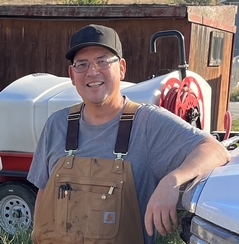
Warren Brown
Lytton First Nation, British Columbia
Nominator: Casey Neathway
"Water is everyone's responsibility. Water professionals are some of the protectors of water and educators of the future protectors. The more a Water Operator communicates with their community about how things are operating, and responding to any quality concerns quickly, creates a level of trust within the community towards the operator."
Read more from Warren Brown
What is the biggest need regarding safe drinking water in your community and how do you feel that your work and engagement has helped to address that need?
In my opinion, there are two needs regarding safe drinking water - the first is Communication and then Conservation.
Communication is a big need in safe drinking water. Communication in the way of showing leaders, community members and school students where their drinking water comes from, how it's processed, and how it's stored. Communicating in a way that is understood by all. Be prepared, be flexible, be clear, be concise, and be calm. The more a Water Operator communicates with their community about how things are operating, and responding to any quality concerns quickly, creates a level of trust within the community towards the operator.
Conservation of water is needed, ensuring our water is safe from industry and natural disasters. Industry may use large amounts of water during production, with possible disruptions in waterways and marine life, by the spilling or dumping of waste materials in waterways or water sheds. Controlling what happens in our water shed areas allows us to restrict what kind of activities can take place, in essence protecting our drinking water. Natural disasters can disrupt a water shed through flooding, landslides, fire and freezing. Each bringing their own complex challenges. The development of good risk assessments of potential hazards in your water sheds would be very proactive in dealing with natural disasters when they happen.
What is your favorite part of your day-to-day work within your community?
Engagements with community members who have questions on water. It's an opportunity to not only answer their questions, but to also try and help them understand the larger picture of the conservation of water within our ecosystem. This would also be the same with the crew of the operations and maintenance department that I manage, guiding my staff to understand and share the same level of knowledge with our community that we serve.
What message would you like to share with others as a way to encourage engagement on safe drinking water and water leadership within your community?
Water is everyone's responsibility. Water professionals are some of the protectors of water and educators of the future protectors. Doing talks and tours of water facilities with local schools, talking about the importance of drinking water and the duties of a water operator, is one way to attract future protectors.
2023 nominees
There are people who, by their everyday actions, guide, influence and inspire. We call them leaders. Each individual or group listed below has been nominated for their excellence and unwavering commitment to ensuring their community has safe and clean drinking water.
Backgrounder: Nominees for the 2023 National First Nations Water Leadership Award
Read messages from this year's nominees and more about the impact they have in their communities.
- Ian Fortin - Chapleau Cree First Nation (ON)
- Katy Thorne - Tk'emlúps te Secwépemc (BC)
- Ernie French-Downey - Takla First Nation (BC)
- Barnett Stewart - Anspayaxw (Kispiox) Band (BC)
- Jim Fox - Toquaht Nation (BC)
- Wilson David - Tla-o-qui-aht First Nation (BC)
- Cody Black Eyes - Piikani Nation (AB)
- CJ Burnstick - Alexander First Nation (AB)
- John Willier, Kris Willier, Kaine Giroux, Styles Giroux - Swan River First Nation (AB)
- Chad Simon - Samson Cree Nation (AB)
- Marvin Steinhauer - Whitefish Lake First Nation #128 (AB)
- James Arcand - Alexander First Nation (AB)
- Simon House - Paul First Nation (AB)
- Leroy Josie - Hatchet Lake Denesuline First Nation (SK)
- Nathan Martell - Moosomin First Nation (SK)
- Perrin Janvier - Clearwater River Dene Nation (SK)
- Harlan Flett - Berens River First Nation (MB)
- Kelly LaRocca - Mississaugas of Scugog Island First Nation (ON)
- Chevaun Toulouse - Sagamok Anishnawbek First Nation (ON)
- Nathan Copenace - Obashkaandagaang (Washagamis Bay) First Nation (ON)
- Public Works Team, Oneida Nation of the Thames (ON) – Ron Elijah, Rob Cornelius, Sam George, Leeland "Lee" Doxtator, James "Aaron" Antone
- Shawn Williams - Curve Lake First Nation (ON)
- Nick Guérin - Manawan, Pakua Shipu & Unamen Shipu (QC)
- Gregg Brewer - Tobique (Neqotkuk) First Nation (NB)
- Valerie Julian-Meader - Millbrook First Nation (NS)
- North Shore Micmac District Council (ATL)
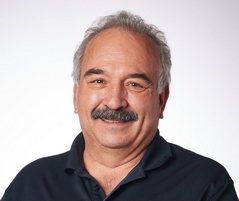
Ian Fortin (3 nominations)
Chapleau Cree First Nation, Ontario
Nominators: Ontario First Nations Technical Services Corporation and Aboriginal Water and Wastewater Association of Ontario
Read more from Ian Fortin
Ian Fortin was a valued, respected and provincially-certified Indigenous water and wastewater operator, as well as an industry advocate and leader. The significance of Ian's contribution to his field, and to his home community of Chapleau Cree First Nation, was acknowledged through multiple posthumous nominations for the National First Nations Water Leadership Award. This is a first in the award's history.
Ian started as a water operator for Chapleau Cree First Nation in 1995 and was deeply committed to improving drinking water conditions on and off First Nations reserves. This was evidenced by his involvement as a Circuit Rider Trainer for the Ontario First Nations Technical Services Corporation, water and wastewater operator in Chapleau Cree First Nation, and his contributions as chairperson for the Aboriginal Water and Wastewater Association of Ontario. Over the course of two decades, he brought his leadership, commitment and passion to the AWWAO, helping expand its services for Indigenous and non-Indigenous Operators throughout Ontario. As a trusted trainer and mentor, he became a familiar face as he travelled to First Nations communities across the province, helping others, sharing his knowledge, and promoting best practices to help them overcome challenges in operating water systems effectively and efficiently. Ian sadly passed away in December 2022 and will be greatly missed by his family, friends and colleagues.
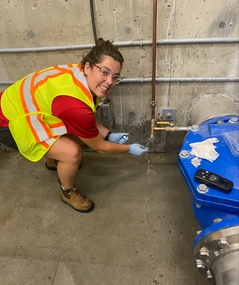
Katy Thorne
Tk'emlúps te Secwépemc, British Columbia
Nominator: Madjid Mohseni
"No matter where you fit in your community, when it comes to safe drinking water, you have a role to play. So, I encourage you to do what you can. Learn, advocate, and respect water because water is life."
Read more from Katy Thorne
What is the biggest need regarding safe drinking water in your community and how do you feel that your work and engagement has helped to address that need?
In my opinion, the biggest need regarding safe drinking water in Tk'emlúps te Secwépemc is policy. As an operator in the community, we follow an Operation & Maintenance Manual for our Wastewater Collection (WWC) System because the expansion in 2011 supplied one. The Water Distribution (WD) System is older, expanding bit by bit over the years. The system as a whole does not have policies and procedures. We are left to make assumptions more often than not and leave preventative maintenance incomplete. When I first started with TteS, I noticed a gap in policy and procedure. Safety programs were minimal if any, upgrades and new installations went unrecorded, and maintenance was basically nonexistent. I feel as though I have addressed the need for policy by refusing unsafe work, setting the standard for recordkeeping, and beginning to write Standard Operating Procedures for both the WWC and WD systems.
What is your favorite part of your day-to-day work within your community?
My favourite part about the day-to-day work in the community is that things are fluid, pun intended! Every day is purposeful, from office hours to field work there is always something on the go. Besides the work, I feel grateful to spend time with a First Nation, learning everything I can from those around me.
What message would you like to share with others as a way to encourage engagement on safe drinking water and water leadership within their community?
I'd like to share the message that no matter where you fit in your community, when it comes to safe drinking water, you have a role to play. Safe drinking water is a right, yes, however it is also a privilege. We know that many communities in Canada still don't have access to safe drinking water. So, I encourage you to do what you can. Learn, advocate, and respect water because water is life.
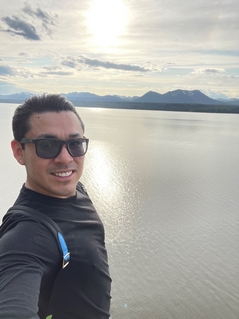
Ernie French-Downey
Takla Nation, British Columbia
Nominator: Blake Blok
"I enjoy working in my home community where I get to experience the beautiful scenery of Takla Landing. I would encourage others to stay the course of furthering their education, and to network and ask for help when they need it from other operators."
Read more from Ernie French-Downey
What is the biggest need regarding safe drinking water in your community and how do you feel that your work and engagement has helped to address that need?
The biggest need in the community is providing potable drinking water, ensuring members are informed of the water quality when situations change, weekly monitoring and maintenance of treatment systems and obtaining the water utility certification from the Environmental Operators Certification Program. I believe that my engagement with Takla Nation's employees and community members, and overall dedication to obtaining a diploma in Water and Wastewater Technology Diploma at Thompson Rivers University, has helped address the needs of the community's water and treatment systems.
What is your favorite part of your day-to-day work within your community?
I enjoy working in my home community where I get to experience the beautiful scenery of Takla Landing, and I appreciate and enjoy interacting with community members and work colleagues alike.
What message would you like to share with others as a way to encourage engagement on safe drinking water and water leadership within their community?
I would encourage others to stay the course of furthering their education, to continue to do what it takes to obtain the endorsement certification from the Environmental Operators Certification Program, and to network and ask for help when they need it from other operators.

Barnett Stewart
Anspayaxw - Kispiox Band, British Columbia
Nominator: Satwinder Paul
"Holding an operator is the most significant need for a small community. My message is to come on down and learn the community infrastructure."
Read more from Barnett Stewart
What is the biggest need regarding safe drinking water in your community and how do you feel that your work and engagement has helped to address that need?
Keeping an operator is the most significant need for a small community. Training and understanding the water/wastewater infrastructure would be the first thing to learn to have the operator understand gradually. Theory and practicum of the infrastructure is the best approach for a new operator. We use the visual, hearing and smell senses when dealing with knowing the system.
What is your favorite part of your day-to-day work within your community?
My favourite part of the day is being able to go home to my family - safety is first in mind when we enter into our busy schedules. The most critical part of the day is the end of the day when we start to feel tired and we can't let our guard down.
What message would you like to share with others as a way to encourage engagement on safe drinking water and water leadership within their community?
In a small community, everyone knows each other. I have an open-door policy with the community and its leadership. Fieldwork allows us to further interact with the members. We basically have to be jack of all trades and certified to none. My message is to come on down and learn the community infrastructure.

Jim Fox
Toquaht Nation, British Columbia
Nominator: Jackie Arsenault
Read more from Jim Fox
Jim Fox has served over 20 years maintaining water systems for the Toquaht Nation. He is nominated for his commitment to the community, going above and beyond during tough winter storms and for his deep technical knowledge.

Wilson David
Tla-o-qui-aht First Nation, British Columbia
Nominator: Karen Larson
Read more from Wilson David
"I, Wilson David, am grateful for the nomination. As I cannot express in words my nomination, just the gratitude. As our EHO, Karen Larsen, has seen my work as a water treatment operator and knows what I do for my First Nation community. Providing safe drinking water for them. And I have shown a few people what I do for water provided for the community."
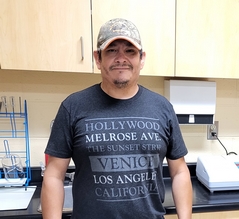
Cody Black Eyes
Piikani Nation, Alberta
Nominator: Lawrence Michetti
"Every day is an opportunity to learn something new. Besides a good drink of water, my favorite part of my job is troubleshooting and repairing the community's water problems."
Read more from Cody Black Eyes
I'm honoured to be nominated and to be a part of the 2023 National First Nations Water Leadership Award process.
What is the biggest need regarding safe drinking water in your community and how do you feel that your work and engagement has helped to address that need?
After Piikani went through an environmental review, the review identified alkali water in a majority of rural water wells that were connected to residents for household use. To address this health concern, the Nation now has three water delivery systems: townsite central water system, rural water distribution and trucked delivery. With our current water plant providing water to approximately 75% of the homes, it is critical that the monitoring and maintenance of the water infrastructure is kept at a high level of performance. We are also upgrading our water plant to be equipped with a UV system to ensure and maintain the top quality of our potable water.
What is your favorite part of your day-to-day work within your community?
Besides a good drink of water, my other favorite part of my job is troubleshooting and repairing the community's water problems. From changing jet pumps and solenoids that control their water systems (electrical) to repairing water leaks and water breaks (plumbing), every day is an opportunity to learn something new.
What message would you like to share with others as a way to encourage engagement on safe drinking water and water leadership within their community?
Aside from delivering quality water and maintaining a high level of maintenance service in the upkeep of the entire water delivery system, we have to be mindful of having an adequate supply of water for fire protection in the health and safety aspect of the community. We are very fortunate to have, and be able to use, the Technical Services Advisory Group program for our community. We have a very knowledgeable circuit rider (Lawrence Michetti) who is great at troubleshooting and hands-on repairs. But most importantly, we have an intelligent and hard-working director (Floyd Provost) who has extensive knowledge about not only our water system, but with all our public works aspects. He is the best manager a person could ask for and I owe all my success to him - he's the main reason for my success.
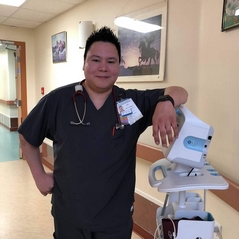
CJ Burnstick
Alexander First Nation, Alberta
Nominator: Joseph Forte
"My favorite part of my job is knowing that my community is using safe drinking water and that I am a part of that process."
Read more from CJ Burnstick
What is the biggest need regarding safe drinking water in your community and how do you feel that your work and engagement has helped to address that need?
The biggest need I think in communities is addressing the basics of how to keep and maintain wells and cisterns. Basic home care and lawn care goes a long way in insuring that wells and cisterns are kept clean from total coliforms or other bacteria. I do my best while on home visits to explain this to home owners, while testing water.
What is your favorite part of your day-to-day work within your community?
My favorite part about my job is knowing that my community is using safe drinking water and knowing that I am a part of that process.
What message would you like to share with others as a way to encourage engagement on safe drinking water and water leadership within their community?
Always have an open mind to concerns about safe drinking water. Community and home owners are uneducated in safe drinking water, so sharing your knowledge about water goes a long way in your community.

Swan River First Nation – John Willier, Kris Willier, Kaine Giroux, Styles Giroux
Swan River First Nation, Alberta
Nominator: Meghan Payne
Read more from Swan River First Nation
John Willier, Kris Willier, Kaine Giroux and Styles Giroux participate in water and environmental monitoring research for Swan River First Nation. Building community capacity for scientific programs and forging relationships with the Lesser Slave Watershed Council, independent consultants and the energy industry, the group helps with outreach and habitat restoration throughout the Swan River.
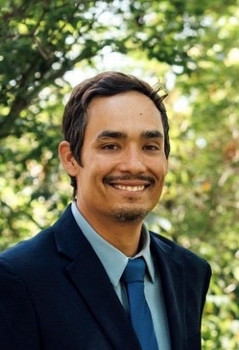
Chad Simon
Samson Cree Nation, Alberta
Nominator: Mario Swampy
"Access to clean water is a fundamental human right, and responsible water management is crucial for our future generation. We can all work together to inspire positive change and ensure that safe drinking water is accessible to all."
Read more from Chad Simon
What is the biggest need regarding safe drinking water in your community and how do you feel that your work and engagement has helped to address that need?
Addressing long standing water infrastructure issues, and ensuring access to clean and reliable drinking water for centralized and decentralized systems. Community engagements have helped our Nation members understand the importance of understanding and protecting our water.
What is your favorite part of your day-to-day work within your community?
My favorite part of my day-to-day work would be engaging with the Nation members. Many conversations that lead to questions about the water quality, as well as the history of water in our local area, drives me to understand more about our life-giving element.
What message would you like to share with others as a way to encourage engagement on safe drinking water and water leadership within their community?
I have become more passionate about promoting safe drinking water and water leadership as my understanding deepens. Access to clean water is a fundamental human right and responsible water management is crucial for our future generation. By raising awareness, encouraging community involvement and supporting strong leadership in water-related initiatives, we can make a meaningful impact. We can all work together to inspire positive change and ensure that safe drinking water is accessible to all.

Marvin Steinhauer
Whitefish Lake First Nation #128, Alberta
Nominator: Ryan Krausher
Read more from Marvin Steinhauer
Marvin Steinhauer, manager of water and wastewater for Whitefish Lake Band #128, has been instrumental in planning and constructing a new drinking water system under tight timelines. His foresight, professionalism, and willingness to stay the course on water initiatives has earned him respect amongst his staff, Chief and Council, engineering partners and the broader community.

James Arcand
Alexander First Nation, Alberta
Nominator: Garry Macdonald
"We hold water to be very sacred in our ways of living in harmony with the land. It's very important for the survival of all people that we protect our water. We need to be responsible today for the better tomorrow."
Read more from James Arcand
What is the biggest need regarding safe drinking water in your community and how do you feel that your work and engagement has helped to address that need?
First and foremost, we hold water to be very sacred in our ways of living in harmony with the land. We have all heard that 'Water is Life' and this rings true always. As well, we hold water to be very sacred, especially considering that women flow water when it is time for them to bring another life into this world. It's very important for the survival of all people that we protect our water. We also recognize water as a Treaty right that was bestowed upon us by our Creator. I want to ensure that I do my part to the best of my ability, to always protect water and ensure it is there for those unborn. We need to be responsible today for the better tomorrow. I want to exemplify this through action and elevation of standard practices and legislation so that they are enhanced to actually protect water and all its sources.
What is your favorite part of your day-to-day work within your community?
My favorite part of day-to-day work within my community is interacting and working with my people. I have always been and will always continue to advocate for my people and the rights of our Nation. It is an honour to be entrusted with such a responsibility and my resolve will always be strong because I want to ensure that I am walking the walk when it comes to creating a better future for all of us. We are connected to the land, water, air and animals and it is our teachings of harmony with Mother Nature that was passed down to me that I carry very close to my heart. Ultimately, I have the ability and, in this way, it equals a responsibility to act, speak and advocate for those who are not here yet or who cannot themselves.
What message would you like to share with others as a way to encourage engagement on safe drinking water and water leadership within their community?
We are stronger together. When we collectively put our hearts and minds together, we can protect our future for our children. If we do our part now, water should never become a high-priced commodity. It should always be available to all the people. Industry and corporations as well need to own up to their mistakes of poisoning water sources and work with the people, especially those on the land to ensure all of us enjoy one of the basic needs of life being water. We need to utilize our educational expertise, combined with our Knowledge Keepers, and create the regulations and legislations that will ensure the survival of our sacred water, as this will ensure all of our survival as the human race as well.
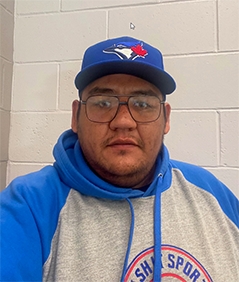
Simon House
Paul First Nation, Alberta
Nominator: Rod Badger
"In my opinion, the biggest need regarding safe drinking water in my community is keeping water systems running and properly staffed. Trained operators are key to helping my community reduce and prevent risks, and ensure that everyone has safe drinking water."
Read more from Simon House
What is the biggest need regarding safe drinking water in your community and how do you feel that your work and engagement has helped to address that need?
In my opinion the biggest need regarding safe drinking water in my community is keeping water systems running and properly staffed. I provide leadership during drinking water emergencies or water infrastructure challenges and am dedicated to keeping our water safe. My work and engagement has helped address that need by monitoring and repairing existing systems. Ensuring that problems are addressed as they arise and that there is ongoing operator support and retention.
What is your favorite part of your day-to-day work within your community?
My favourite part of the day would be when I arrive to the plant. I monitor the operation of the plant, adjust treatment processes, conduct routine maintenance and ensure the water quality meets the guidelines. When things go haywire, I am able to solve the issues and feel a sense of accomplishment and pride that I have helped in keeping my community's drinking water safe.
What message would you like to share with others as a way to encourage engagement on safe drinking water and water leadership within their community?
Trained operators are key to helping my community reduce and prevent risks, and ensure that everyone has safe drinking water. Teaching community members and students the importance of water in our lives. Sharing knowledge, collaborating and demonstrating safe water practices to the community is what I like to encourage.
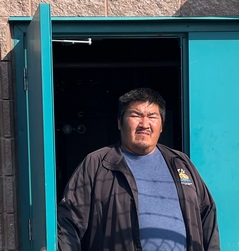
Leroy Josie
Hatchet Lake Denesuline First Nation, Saskatchewan
Nominator: Rebecca Zagozewski and Deon Hassler
"I encourage anyone who is interested in the field of water treatment not to get discouraged about the responsibility that comes with the job. Education is a must, both for the public and the operator."
Read more from Leroy Josie
What is the biggest need regarding safe drinking water in your community and how do you feel that your work and engagement has helped to address that need?
The biggest need in my view would be education in the field of water treatment, both for the public and the operator.
What is your favorite part of your day-to-day work within your community?
My favourite part of the day is when we finish doing our morning rounds of all the stations, and don't find any deficiencies on our system. Which means we don't have to cancel our maintenance plans for the day.
What message would you like to share with others as a way to encourage engagement on safe drinking water and water leadership within their community?
I believe public education for the field of water treatment is a must, not only for water but towards wastewater as well, and that it is important for safe drinking water and safe wastewater disposal. I encourage anyone who is interested in the field not to get discouraged about the responsibility that comes with the job – you will eventually lean to deal with the situation sooner or later.
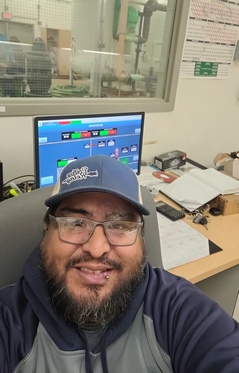
Nathan Martell
Moosomin First Nation, Saskatchewan
Nominator: Darren Pooyak
"My biggest message to share would be for everyone to have patience with growth. Realize all the work that goes on in the background. We've advanced so much already and it's something to be proud of."
Read more from Nathan Martell
What is the biggest need regarding safe drinking water in your community and how do you feel that your work and engagement has helped to address that need?
The biggest need is clean, safe water for everybody, that meets the guidelines set out for us. We need to make sure the water is being treated and make sure the water source won't cause any further issues. Make sure it's a good, certain quality so we're not creating any issues for the plumbing or infrastructure etc. from bad quality of water. For reserves, those issues add up quite quickly.
What is your favorite part of your day-to-day work within your community?
I've been with my community for quite some time and I work with all the contractors, engineers and project teams. And together we plan and design everything that's needed for water on the reserve. I give them a wish list from my perspective and they review it to see if the government will approve it like upgrades, lift stations or water plants. Being able to direct operations in a direction I feel it needs to go and being part of that team, that's my favorite part of my day-to-day. Being able to work directly with the engineers, planners and local government officials and project teams that come out to work with us, I can voice my concerns and experiences that can help plan for something that I think would help the reserve the best way possible. I've been there for almost 20 years and the reserve has come leaps and bounds in advancement and been through so much change and growth, from the basic water plant they had when I first started that was so outdated. That's the best part, seeing the progress and growth after long, long hours put into getting where we are today. And we still aren't there yet, there's still lots to do but always doing something is a good part of the job.
What message would you like to share with others as a way to encourage engagement on safe drinking water and water leadership within their community?
From my experience working with various reserves and helping them, my biggest thing to share would be for everyone to have patience with growth. Nothing happens overnight and it's very hard to please everybody. There are more complaints then compliments in this business. But people need to show patience, let things play out and we will slowly get there. I'm noticing throughout the country that people are finally noticing how important this work is and starting to get the work done. I realize everyone has concerns but they don't realize all the work that goes on in the background. That everything has to be studied and put in place according to guidelines. So patience is a big, big thing because it's important – it's water. There's never a thank you but they don't realize the work that has been done by the team to get to where we are, the studies and the planning and applying for funding working with the government to come up with the best plan forward. And that is so much work. So be patient with us. It is a process and we have to think of all the impacts and it just takes time. But in the big picture, since I first started, we've advanced so much already and it's something to be proud of. But it's not recognized as much as I'd like it to be. It's starting now but it's a no thank you job. To make it work, you need a group of people and I really appreciate the people that step up. Keep doing it and eventually we will get there!
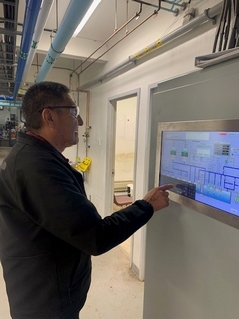
Perrin Janvier
Clearwater River Dene Nation, Saskatchewan
Nominator: Joe McKay
"The biggest need in my community is ensuring people receive the proper certification and job knowledge required to manage and operate our water treatment plant effectively, to ensure the facility is producing and distributing safe and healthy water to our residents. This is a lifetime job and commitment to your community."
Read more from Perrin Janvier
What is the biggest need regarding safe drinking water in your community and how do you feel that your work and engagement has helped to address that need?
The biggest need is ensuring people in our community receive the proper certification and job knowledge required to manage and operate our water treatment plant effectively, to ensure the facility is producing and distributing safe and healthy water to our residents. I have received both and now am working to share this knowledge with others.
What is your favorite part of your day-to-day work within your community?
The best part is doing my testing and getting positive results. And also when band members approach me to tell me how clean the water is and how good it tastes.
What message would you like to share with others as a way to encourage engagement on safe drinking water and water leadership within their community?
Get proper education and certification to become a water plant operator, as this is a lifetime job and commitment to your community.

Harlan Flett
Berens River First Nation, Manitoba
Nominator: Shaun Miles
"My message to others would be keep sending in water reports on a weekly basis, and talk to the water plant workers on how we might correct issues. Keep plugging away!"
Read more from Harlan Flett
What is the biggest need regarding safe drinking water in your community and how do you feel that your work and engagement has helped to address that need?
The biggest need was updating our water plant. I guess the reports I email out every week had some effect on the needs of the people of Berens River.
What is your favorite part of your day-to-day work within your community?
My favorite part of work was doing the testing each week. It made me think I was doing my part in making sure we had drinkable water to use for our community.
What message would you like to share with others as a way to encourage engagement on safe drinking water and water leadership within their community?
My message would be keep sending in those water reports on a weekly basis and talk to the water plant workers on how we might correct issues. Thank you for the nomination and many thanks to my fellow community-based water monitors. Keep plugging away.

Kelly LaRocca
Mississaugas of Scugog Island First Nation, Ontario
Nominator: Keith Lepine
"Safe, clean drinking water is required for all life and is a human right. I hope one day that Scugog could become its own water authority and serve our neighbours. My message to share with others is to engage in ceremony around water, as our culture keeps us fuelled in our work."
Read more from Kelly LaRocca
What is the biggest need regarding safe drinking water in your community and how do you feel that your work and engagement has helped to address that need?
Safe, clean drinking water is required for all life and is a human right. Without clean water, health, safety and economic self-sufficiency cannot happen. I hope one day that Scugog could become its own water authority and serve our neighbours. This would further aid in economic reconciliation.
What is your favorite part of your day-to-day work within your community?
My favourite part is strategic thinking, with and for the community. Individual rights often seem to trump collective action, and I enjoy figuring out ways to best serve the collective.
What message would you like to share with others to encourage engagement on safe drinking water and water leadership within their community?
Never stop advocating! And never stop short of advocating for your systems to meet and/or exceed provincial drinking water standards. Engage in ceremony around water, as our culture keeps us fuelled in our work when we are told "no" or that it "can't be done".
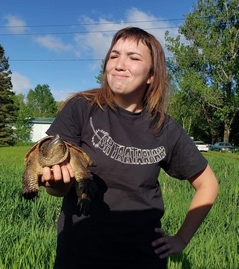
Chevaun Toulouse
Sagamok Anishnawbek First Nation, Ontario
Nominator: Bob Spencer
"I feel as though I have a calling to try and conserve our fragile water ecosystems. Many Indigenous people understand that caring for the land and environment is a sacred responsibility. With this viewpoint, it is easy to understand why the greatest abundance of biodiverse life is found in places where Indigenous people continue to steward the land, honouring the responsibility of caretaker."
Read more from Chevaun Toulouse
Recipient of the Ontario Native Women's Association (ONWA) Protecting Mother Earth Award
What is the biggest need regarding safe drinking water in your community and how do you feel that your work and engagement has helped to address that need?
Chevaun Toulouse nindizhinikaaz. Sagamok Anishnawbek nindonjibaa. Ginoozhe nindoodem. Anishinaabe kwe ndow. My name is Chevaun Toulouse; I am a mother and a full-time biology and Indigenous environmental science student at Trent University. I am Ginoozhe (pike) clan and as an Anishinaabe kwe, I feel as though I have a calling to try and conserve our fragile water ecosystems. Sagamok Anishnawbek (also known as Many Rivers' Joining-Human Beings and Two points joining) is situated between Lake Huron and the Spanish River. It is located across from Manitoulin Island, the largest freshwater island in the world. There are many lakes and wetlands in my community, home to many wetland species now at risk.
I assisted with the implementation of the Toronto Zoo's Turtle Island Conservation programme (TIC) with Adopt-A-Pond's Blanding's turtle head starting and reintroduction project in the Rouge Urban National Park. My position was the release and monitoring of species at risk turtles into the Rouge National Urban Park. Through the development and delivery of programming/resources for TIC, I was involved with outreach, education and distribution of educational materials to schools and communities. I presented on "Conservation as Tradition: Protecting Biodiversity in First Nations Communities" at the Biodiversity Without Boundaries, Nature Serve conference. I was also a conference speaker at the Ontario Nature, Protected Areas and Climate Action in Ontario: A Cross-Cultural Dialogue, in Kingston, ON.
When I was not working for the Toronto Zoo, I was doing outreach for Indspire; a national Indigenous-led registered charity that invests in the education of Indigenous people. I worked for The Magnetawan First Nation Lands, Resources and Environment Department as the Lead Species at Risk Field Technician and Cultural Coordinator. I conducted daily road and habitat surveys, rattlesnake gestation surveys, and collected data on reptiles. I radio-tracked species at risk to better understand their spatial use of the landscape, so this data can inform land-use and development. I recently held the position of researcher for an incredible TV series just released called Great Lakes Untamed. Great Lakes Untamed is the first definitive natural history TV series illustrating this vast watershed's incredible wildlife, landscapes, and human importance.
Many Indigenous people understand that caring for the land and environment is a sacred responsibility. There is an understanding of relation to the land - where the land, humans and non-human life are all interdependent in a cyclical way. With this viewpoint, it is easy to understand why the greatest abundance of biodiverse life is found in places where Indigenous people continue to steward the land, honouring the responsibility of caretaker.
In the past century, the Great Lakes-St. Lawrence watershed has been disrespected, exploited, developed and polluted, despite the fact that the Great Lakes hold approximately one quarter of the planet's freshwater and sustain life for countless species, Indigenous Nations and communities. The Great Lakes-St. Lawrence watershed is the world's largest freshwater ecosystem and we have an incredible responsibility to protect and restore this global treasure.
There is an associated Biinaagami educational campaign which aims to ensure the involvement of First Nations in decision making about the Great Lakes. It is planned that this will go out to 25,000 teachers in Canada. Biinaagami is a shared responsibility. We celebrate the Great Lakes-St. Lawrence — and advocate for their cultural and ecological sustainability. To share the stories of the watershed. To bring people together. To help communities, organizations and people help each other take collective action to ensure the health of this incredible resource. Biinaagami is a multi-year, collaborative project centered around a shared responsibility we all have to protect the lands and waters within the Great Lakes-St. Lawrence watershed. Biinaagami is a collaboration of charitable organizations, Indigenous leaders, educators, film makers and business leaders. Project partners Canadian Geographic and Swim Drink Fish have worked closely with Indigenous leaders, knowledge keepers and language speakers from the watershed to name the project and start a movement. We hope this project, these ideas and feelings will take shape and grow with every collaborator, partner, organization and individual who gets involved. A large, diverse network is needed to protect the Great Lakes-St. Lawrence watershed and we are only just beginning. Helping us raise awareness of the precious life sustained by the Great Lakes are seasoned film makers Ted Oakes and Merit Jensen Carr, who have created a series of three awe-inspiring documentaries called Great Lakes Untamed.
What is your favorite part of your day-to-day work within your community?
Growing up in Sagamok gave me an interest and respect for the environment, as much of my youth was spent trying to catch turtles and snakes in the swamp. Whether snatching snakes or catching turtles, it was on the land, chasing reptiles and amphibians, that I found my happiness. I also found my career.
I have been able to gain wildlife filmmaking experience, and enlighten others on Indigenous ways of being and land stewardship, in search of a snake - the Blue Racer. A large non-venomous snake, the Blue Racer (in Ojibwe, Wampum Gnebig) is endangered and found only in one part of Canada, Pelee Island, the southernmost tip of the country. While for many westerners, the snake only offers a sense of fear, for many First Nations, snakes are spiritual guides, protectors and are commonly depicted in petroglyphs and birch-bark scrolls. Not only do they appear as helpers and healers, particularly for women, but snakes are said to have created the rivers with their twisting movements. And these are the understandings and traditions that I hope to bring to western science, to ensure that biological classifications and concepts are imbued with the wisdom of those who have known this land the longest.
I recently contributed to a Bilingual (Ojibwe/English) reptile and amphibian species at risk colouring book for youth, in partnership with Magnetawan First Nation. The colouring book features some of my Ojibwe language research and nature photography of reptiles in Magnetawan First Nation. Each page featured colouring images that were converted from photographs taken by staff of common reptiles such as snakes (gnebikoog) and turtles (mishiikenyag) found on Magnetawan First Nation. Along with English, the colouring book provided both northern and southern dialects of Anishinaabemowin as well as phonetic spelling to work as a guide. Magnetawan is a small community with few language keepers left. The book will be a starting point to engage in conversations with other First Nation communities on how they identify species and create a larger resource base.
What message would you like to share with others to encourage engagement on safe drinking water and water leadership within their community?
In the past century, the Great Lakes-St. Lawrence watershed has been disrespected, exploited, developed and polluted, despite the fact that the Great Lakes hold approximately one quarter of the planet's freshwater and sustain life for countless species, Indigenous Nations and communities. The Great Lakes-St. Lawrence watershed is the world's largest freshwater ecosystem and we have an incredible responsibility to protect and restore this global treasure. Bringing an Indigenous scientific perspective to this project was important to me, while also highlighting the current environmental struggles our Great Lakes face. Environmental film projects are important in helping to build a better appreciation for nature, while also having a call-to-action for wildlife conservation. This TV series highlights the incredible wildlife behavior, landscapes and some human stories within the Great Lakes watershed.
Many people do not understand that the land is more than the wildlife it houses. Filmmakers can bring the viewer to eye level with the land itself and those who depend on it to survive. Filmmakers can provide a spotlight for those who need to be acknowledged, such as those suffering from environmental loss and degradation. My Nokomis was a farmer, residential school survivor and business owner. My Mishomis was a hunter, business owner, and chief of Sagamok Anishnawbek. The legacy of residential schools profoundly shaped my home and family, The colonial interference in my family and my environment, and the intergenerational trauma passed down, means I have had to seek out and rebuild cultural connections with people and the land. This is especially important now that I am a mother. My son inspires me to be the best Anishinaabe kwe I can be. I want him to know his language and culture, which is why I am learning it with him. I want to conserve and protect our beautiful land for my little ginoozhe (pike). I have been working in the field of conservation in Ontario wetlands for many years as well as developing and providing outreach to other First Nation communities in the field of conservation. I am hoping to continue working in conserving our Great Lakes as a species at risk biologist for my community.
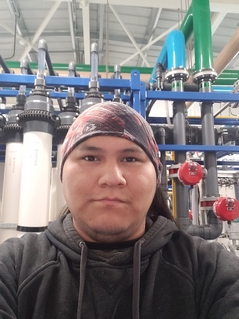
Nathan Copenace
Washagamis Bay - Obashkaandagaang First Nation, Ontario
Nominator: Adam Peacock
"What is the biggest need for safe drinking water in my community - there is a lot I can answer. I think just having it available would be the biggest. I want to share that there are a lot of ways to engage the community. Invite them to the plant for a tour and explain why the water is treated."
Read more from Nathan Copenace
What is the biggest need regarding safe drinking water in your community and how do you feel that your work and engagement has helped to address that need?
The biggest need for safe drinking water in my community - there is a lot I can answer with to that question. I think just having it available would be the biggest. I remember before the new water treatment plant, parts of the community would be without water for days. That would mean people would be using the drinking water they got from jugs for daily use.
What is your favorite part of your day-to-day work within your community?
I like when there is nothing going on. I remember I would get calls at all times of the day. People calling saying no water and wondering when it is going to come back on. Waiting on parts to arrive and hoping they are the right parts.
What message would you like to share with others as a way to encourage engagement on safe drinking water and water leadership within their community?
There is a lot of ways to engage the community. Inviting them to the plant for a tour. Explaining why the water is treated and why chlorine is used in treatment. A lot of people do not trust chlorine. This distrust comes from a lack of knowledge and whatever info is present on the internet. A lot of water treatment systems use a different variety of chlorine solutions. Explaining it has it challenges especially to traditional people. "Water is life and everything needs it. Why do we need to treat it when everything around it flourishes. We never needed to treat it before why now?" Tough questions like these have simple answers. Explaining them is a little harder.
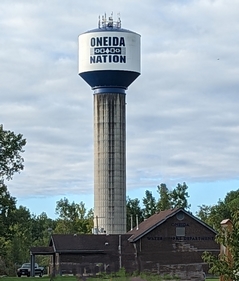
Public Works Team, Oneida Nation of the Thames – Ron Elijah, Rob Cornelius, Sam George, Leeland "Lee" Doxtator, James "Aaron" Antone
Oneida Nation of the Thames, Ontario
Nominator: Pamela Tobin
"This team works day-to-day serving our community. Being available to our community to help whenever needed is very rewarding."
Read more from the Public Works Team, Oneida Nation of the Thames
What is the biggest need regarding safe drinking water in your community and how do you feel that your team's work and engagement has helped to address that need?
Our biggest need is getting our community off our current boil water advisory. The team has worked hard to keep the community safe, with constant monitoring and being proactive to community needs as much as possible.
What is your favorite part of your day-to-day work within your community?
This team works day-to-day serving our community. Being available to the community to help whenever needed is very rewarding.
What message would you like to share with others as a way to encourage engagement on safe drinking water and water leadership within their community?
Be persistent and spread awareness. It's important to be constantly communicating to those around us who are unaware of these situations. We need to stand together with other communities in crisis in spreading the word.
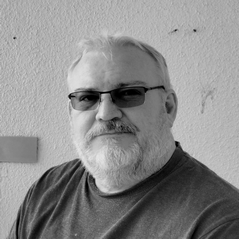
Shawn Williams
Curve Lake First Nation, Ontario
Nominator: Lori Coppaway
Read more from Shawn Williams
Shawn Williams has been a tireless fighter for clean water in his community as a water infrastructure coordinator. Now retired, he volunteers his time to support the Curve Lake administration in seeking financing for water and wastewater facilities, and arranging for members to receive water operator training.
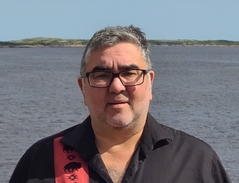
Nick Guérin
Manawan, Pakua-Shipu & Unamen Shipu, Quebec
Nominator: Marc LeMay
If you're hard-working, have a practical intelligence, like to understand how things work, responsible – being a water operator is a job you might enjoy. It's important work. It's honest work."
Read more from Nick Guérin
What is the biggest need regarding safe drinking water in your community and how do you feel that your team's work and engagement has helped to address that need?
The biggest need in Unamen Shipu when I arrived 4 years ago was to repair, modify or replace malfunctioning equipment that was affecting water production, distribution and treatment stability. I drew up technical reports on the deficiencies, identified avenues for correction and brought together key players from the Band Council, Tribal Council and Indigenous Services Canada to take steps that culminated in various projects totaling $2.5 million. Major problems included the fire pump not working, chlorination system not working, distribution pumps that barely supplied the village, major pressure fluctuations on the network, and coagulant and carbonate systems not working. Many other modifications were made to optimize the plant. I'm proud to say that what's in this plant is my vision applied.
For the future, the greatest needs are:
- Taking control of the pumping station currently managed by the Village of Gethsemani. Not having access to its supply is illogical and counter-productive. For example, the pumping station was almost washed away 2 years ago and we didn't know which emergency plan to adopt - the Band Council's or Gethsemani's. Moreover, there is no emergency plan for Gethsemani. What's more, there's no plan B if this happens. When I arrived, I was told that there were talks to resolve the problem but that it had been stalled for some time. So I explained it to the key players, made them aware of it, put a bit of pressure on and it's progressing. Apparently we're now talking about the details and are on the verge of concluding this agreement.
- Insufficient manpower. It's a 24/7 plant. There should be 3 of us, but for the last 4 years there have only been 2. Recently a trainee has been added who is hard-working and with potential. We almost lost him because he and my employer couldn't agree on pay. I spoke to my boss and to the firm in charge of finance and human resources, and convinced them that unless they offered a decent, competitive salary, they'd never keep employees for the long term. We need to take charge of our infrastructure and that can only be done with employees who have gained good experience. Staff turnover is not good for a plant. I train them to the best of my ability, passing on my knowledge so that there's continuity, because the bulk of my career is behind me. It takes a succession.
- Aqueduct leaks. It's pretty complex and we don't have leak detection equipment, which is a bit out of my field of expertise. And we have a lot of non-functioning aqueduct valves that prevent us from isolating parts of the aqueduct. The plans are not up to date. We have broken hydrants. But we also supply the Village of Gethsemani without having the right to inspect their dilapidated infrastructure. We're losing 40% of our production. We're at the beginning of the process. I've met with my General Manager and my Director of Technical Services. In the next few days, I'm going to contact Jimmy Trudel, Mamit-Innuat's new Director of Technical Services, to introduce myself and explain the situation to him. What we want is a conference call with the key players and then we'll take it from there. Among other things, we want Indigenous Services Canada to take part, the circuit rider trainers Marc Lemay and Benoit Benoit who will have relevant suggestions to make, my DG and the technical department. In fact, I'm looking beyond the current leaks. We have problems on the network that need to be solved, and if we don't deal with them, one day we'll find ourselves in the same situation as Mingan - emergency measures and no distribution for months.
What is your favorite part of your day-to-day work within your community?
My family is in Manawan. My mother is buried there. I worked for a long time in Pakua Shipi and had to do a Band transfer for full access to health care. Then I was contacted by Unamen. I consider all 3 places to be my communities. I definitely like working in a First Nations environment. I worked in the city after my DEC. It was okay but I prefer to be in my own world. I like having an impact. When I go home in the morning, I go to my plant. I don't want to be just a number on a team. Through hard work, I've come to understand how my plant works. I'm rarely caught off guard and it's good to work with confidence.
What message would you like to share with others as a way to encourage engagement on safe drinking water and water leadership within their community?
If you're hard-working, have a practical intelligence, like to understand how things work, responsible – this is a job you might enjoy. It's important work. It's honest work. With experience, if you're serious and if you have the desire, you'll get good at it. There are ways to earn a good living and provide your families with everything they need.
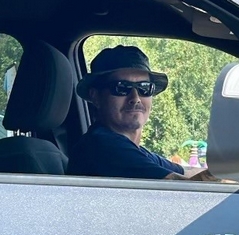
Gregg Brewer
Neqotkuk - Tobique First Nation, New Brunswick
Nominator: Michael Spurvey
"Water is life. Take care of it, conserve and respect it. And never take it for granted."
Read more from Gregg Brewer
What is the biggest need regarding safe drinking water in your community and how do you feel that your work and engagement has helped to address that need?
Treatment, storage and distribution are key to providing safe drinking water. Qualified operators are required in any community facility. I have obtained many certificates in this field and I believe myself and my crew are working diligently every day to continue to provide this service.
What is your favorite part of your day-to-day work within your community?
Being involved in different projects throughout the community, providing water and wastewater service to community members, and helping to educate the people in conservation of nature's most valuable resources.
What message would you like to share with others as a way to encourage engagement on safe drinking water and water leadership within their community?
Water is life. Take care of it, conserve and respect it. And never take it for granted.
Thank you for the recognition. I'm looking forward to spreading awareness of safe water amongst First Nation Communities across Canada.

Valerie Julian Meader
Millbrook First Nation, Nova Scotia
Nominator: Karen Boyles
Read more from Valerie Julian Meader
Valerie Julian-Meader is a community-based water monitor in Millbrook First Nation. A studious record keeper, she works closely with health officers to execute testing and water treatment processes. In addition, Valerie has shared her experiences at training sessions for water monitors, showing the intricacies of the science behind water collection and analysis.

North Shore Micmac District Council
Atlantic Region
Nominator: Jacob Jadis